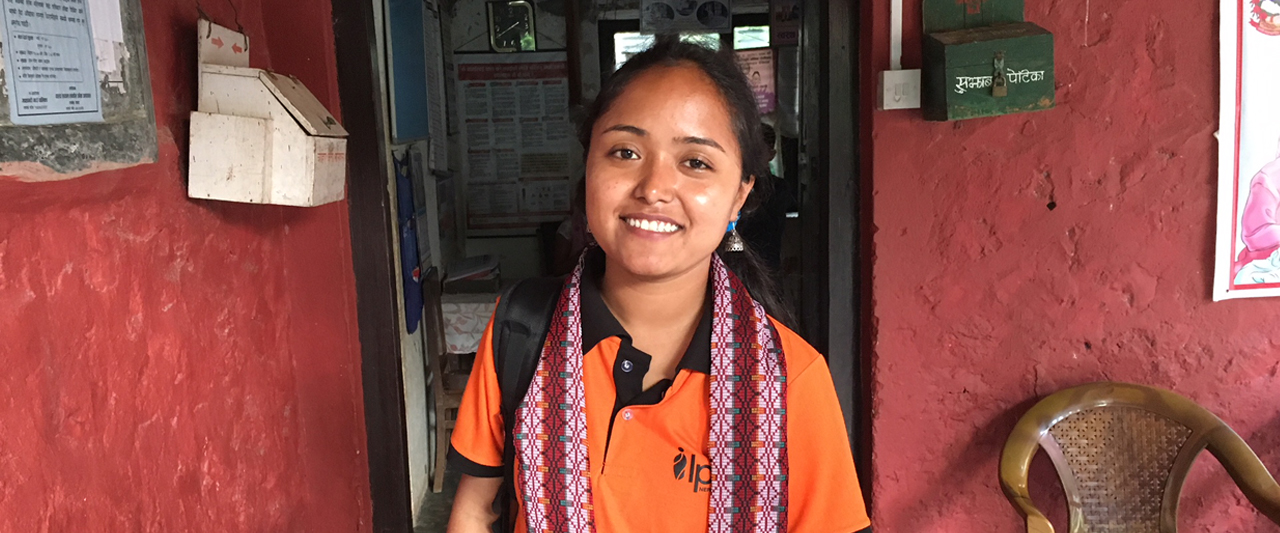Prior to 2002, abortion was illegal in Nepal, but today women and girls have the right to safe, legal abortion free of charge at public health facilities. In this Q & A, Radhika Nayaju, a district coordinator for Ipas Nepal, talks about the challenges of making access to abortion services a reality for women in the Palpa District, and points to some of the women who inspire her.
What is a typical day like in your work with Ipas Nepal?
My goal each day is to stay in regular contact with service providers, clients and district health officials. We want to make sure that abortion and contraceptive services are being provided, and that all the necessary supplies are in stock. I also help to organize community events, where we focus on the importance of safe abortion and try to clear up any misconceptions about abortion-related issues.
What inspired you to get involved in the sexual and reproductive health and rights field?
Like most adolescents, there was a time when so many questions and uncertainties swirled around in my head—but I had so little knowledge! School books and newspapers were the only sources of information. In order to learn more about health, especially reproductive health, I studied nursing. I then wanted to share that knowledge with other women and girls. Working in this field and joining Ipas was a way to do that—and to be part of making a positive change for women and girls in
Nepal.
What is the best thing about your work, and what is most challenging?
The best thing is that I am working with women and girls to give them truly enlightening information about basic reproductive health information—information that is usually not shared or even spoken about in our communities. It reminds me of
myself, when I was at the stage of being so curious to learn and had no one to
talk with.
The most challenging part is doing this work in a patriarchal society, where women’s
health is often neglected, where many women are subjected to domestic violence,
and where abortion is stigmatized. This kind of culture and mindset affects adolescents, especially. Another challenge is that I am working in a hilly region of Nepal, where there is very little public transportation, and roads are narrow and subject to landslides during rainy season. Luckily, I have a very good relationship with district health office staff, and am often able to share a ride with them for field visits to service sites. This is a great help!
In your contact with abortion service providers and health facilities, have you heard stories of unsafe abortion? Is there a story you could share?
Yes, I have heard stories. One involved a young woman in her early twenties, who already had one child, and wanted to terminate a pregnancy. Even though safe abortion services were available nearby, she was shy and did not want to have a pelvic
examination, so she attempted to end the pregnancy using an unsafe method. A few days later, she went to the Palpa District Hospital, pale and complaining of heavy bleeding. There, she was able to safely terminate the pregnancy and also received counseling and postabortion family planning services. She later talked with a service provider by telephone and reported that she was in good condition and felt that the care at the health facility had saved her life.
Stories such as this are why Ipas keeps working in communities with women and adolescents to let them know that safe services are available. Many of them tell us in these meetings that it is the first time in their life they have heard about safe abortion care. Before they leave the meetings, I give them my phone number, and also phone numbers of service providers, so that they can contact us directly if they are seeking abortion care.
Is there a woman who has been particularly inspiring to you?
There are many! One is Anuradha Koirala, a social activist who is regarded as a national hero in Nepal. She is the founder of Maiti Nepal, an NGO dedicated to helping victims of sex trafficking. I had a chance to meet her four years ago, and I was impressed by her calm personality, considering the very bold and brave nature of her work. She has inspired me to serve Nepali women in every way I can.
I am also inspired by the many women who are serving as local government leaders throughout Nepal and are trying their best to develop new policies, programs and funding for the betterment of women’s health throughout Nepal. One of my role models is Radha Shrestha, deputy mayor of Rambha Rural Municipality, who has been very supportive of making safe abortion services available and accessible. Her support of women and girls in need of reproductive health care is so genuine and optimistic—it motivates my work even more.
For more information, contact [email protected].



